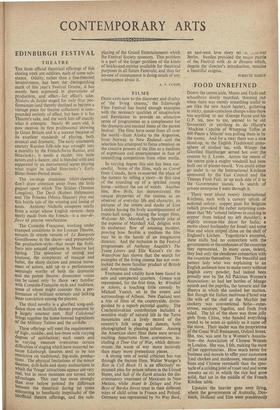FILMS DEDICATED now to the discovery and display of `the
living cinema,' the Edinburgh Film Festival has found enough examples with the necessary qualities of imagination and Revelation to provide an attractive series of programmes as a complement for the dramatic and musical items of the parent festival. The films have come from all over the world—from Alaska to the Argentine, from Norway to New Zealand—and the selection has attempted to focus attention on the creative powers of the film as a inedium of expression and entertainment in face of intensifying competition from other media.
In varying degree this aim has been suc- cessful. Some of the films, such as Corral from Canada, have re-asserted the place of the camera by telling a story—in this case of the rounding up of a spirited young horse—without the use of words. Another film, Bow Bells, has demonstrated the unique properties of the cinema as an observer of everyday life and character, its pictures of the streets and docks of East London having the lively accontaniment of music-hall songs. Among the longer films, Welcothe Mr. Marshall, a Spanish joke at the expense of Marshall Aid, delights with its exuberant flow of amusing incident, proving how flexible a medium the film may be in the hands of an imaginative director. And the inclusion in the Festival programmes of Anthony Asquith's The Young Lovers and Elia Kazan's On the Waterfront has shown that the search for examples of the living cinema has not over- looked the more familiar product of British and American studios.
Freshness and vitality have been found in new and unexpected quarters. Greece was represented, for the first time, by Windfall In Athens, a touching little comedy by Michael Yannis, set in the streets and surroundings of Athens. New Zealand sent a trio of films of, the countryside, distin- guished by a superb pictorial quality. The Czechoslovakian contribution included a sensitive study of natural life in the Tatra mountains and . a lively record of the country's folk songs and ..dances, both photographed in pleasing colour. Among the American short films there were several exciting departures from convention, in- cluding A Time Out of War, which demon- strates the waste of war more incisively than many more pretentious pieces.
A strong vein of social criticism has run through the feature films. Walter Wanger's Riot in Cell Block 11 is an effectively- re- strained plea for prison reform in the United States, and Salt of the Earth attacks the dis- criminatory treatment of Mexicans in New Mexico, while Avant le Deluge and Five Boys of Barska Street treat in their different ways of child crime in France and Poland. Germany was represented by No Way Back, an east-west love story set in p.:st-war Berlin. Sweden provided the major puzzle of the Festival with As in Dreams which, . despite the director's introduction, remainsi a beautiful enigma.
FORSYTH HARDY


































 Previous page
Previous page